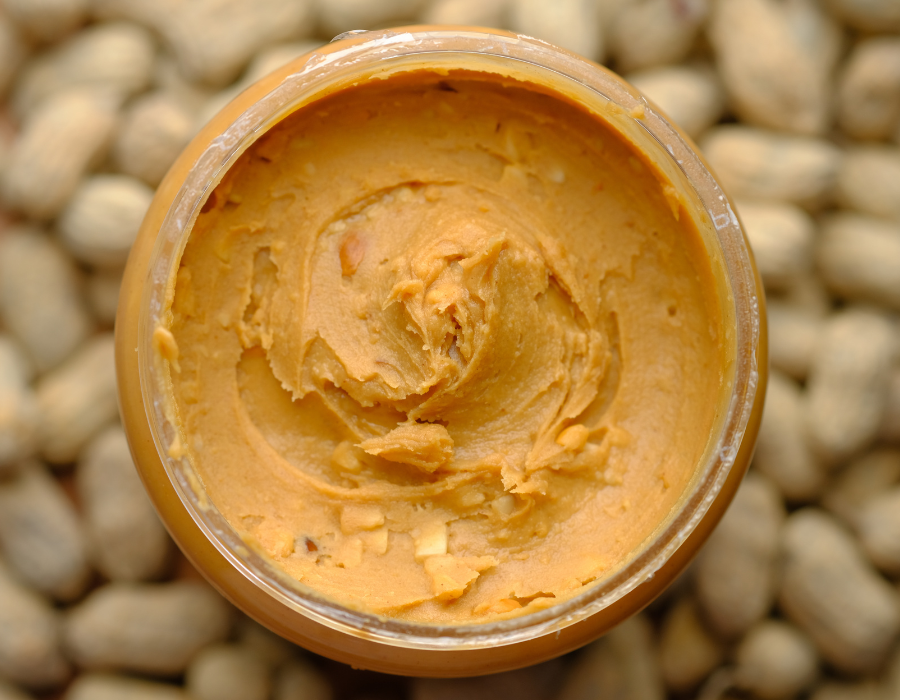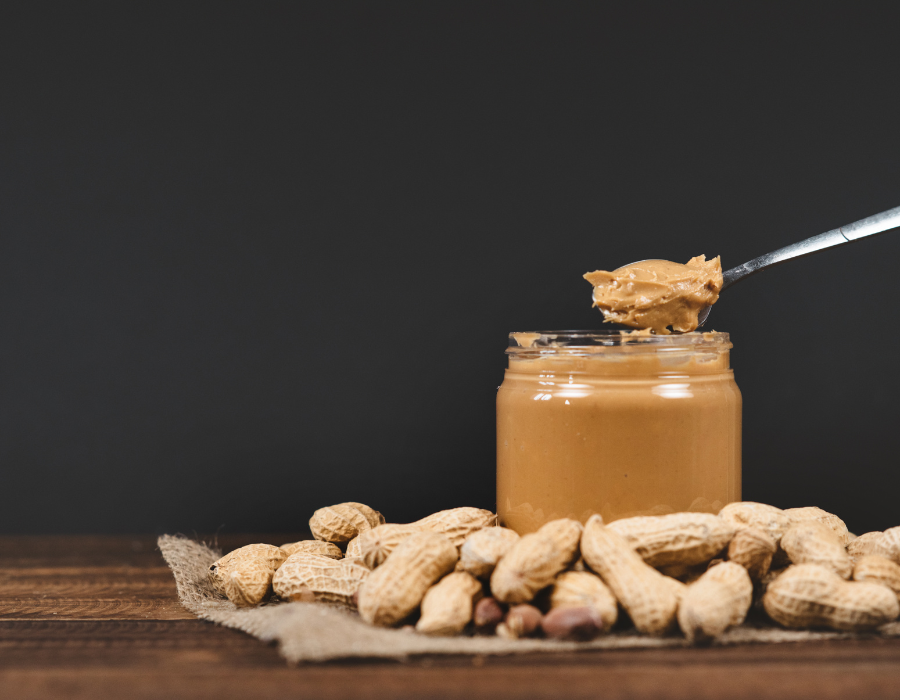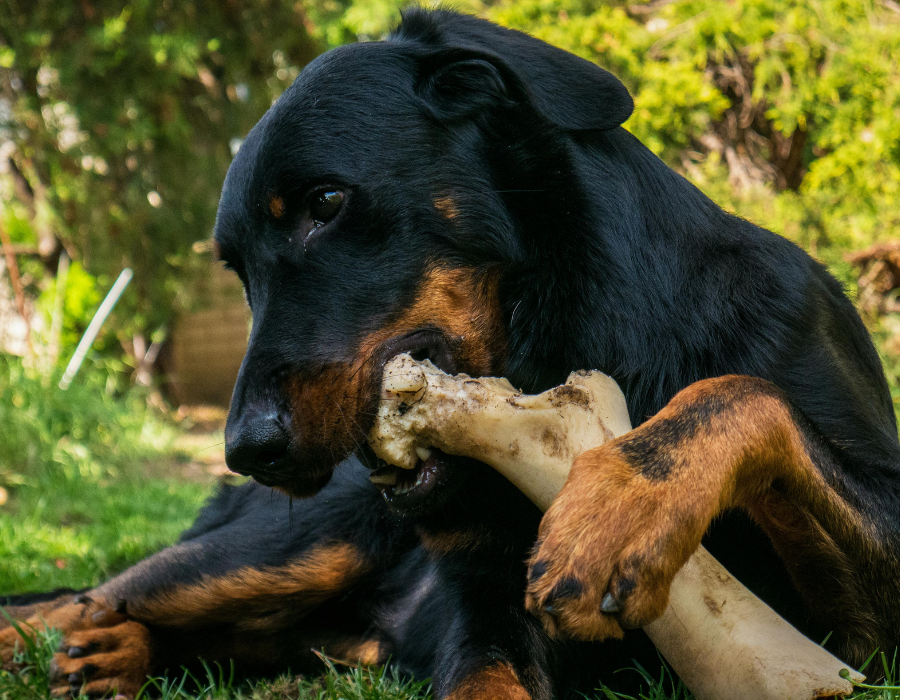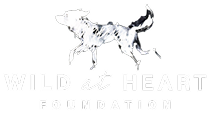The Origins of Peanut Butter
Inspired by four leading lights over a century ago: Marcus Gilmore Edson of Canada, Dr John Harvey Kellogg, Dr Ambrose Straub of St. Louis, Missouri, and chemist Joseph Rosefield.
In 1884, Edson developed a process to make peanut paste from milling roasted peanuts between two heated plates. The famous cereal maker and health food specialist of the time, Kellogg, patented a process with raw peanuts in 1895. Dr. Straub is responsible for patenting a peanut butter making machine in 1903.
But the man who brought us the peanut butter we know and love today was Joseph Rosefield. In 1922, through homogenization, Rosefield was able to keep peanut oil from separating from the peanut solids. He later sold the patent to a company that began making Peter Pan peanut butter.

Nutritional Values of Peanut Butter
As a canine nutritionist I’ve watched the doggy peanut butter market boom, and I find it very worrying. What perplexes me is the rise in ‘dog-friendly’ peanut butter cramming supermarket and pet shop’s shelves. From ‘flavoured’ chews, foods, treats, and peanut butter to use with interactive toys for dogs.
A whole food, minimally processed, organic raw brand of peanut butter is good in moderation for humans, packed with bio-available protein, along with a good source of Vitamin B6, Vitamin E , Calcium, Iron, Potassium, and its rich in monounsaturated fat; but nuts are not a species appropriate ingredient for dogs, as they’re not comprised of animal fats and animal proteins.
Peanuts are in fact a legume; so, they’re from the family that includes lentils, beans, peas, and chickpeas. All of which are very nutritious for humans as omnivores, but not so much for dogs as carnivores.
The Myth of Peanut Butter
Whilst peanut butter is marketed as perfect for use in enrichment accessories like LickiMats, and if you think that a Kong stuffed with an organic and sugar/Xylitol-free peanut butter is safer than ultra-processed biscuit treats, the hard fact of the matter is that this is not correct!

Most peanut butter contains Aflatoxins, which are naturally occurring mycotoxins found in peanuts, figs, and hazelnuts, produced by a fungus called Aspergillus. Over time, such mycotoxins accumulate and target the liver, which can lead to serious liver damage, even cancer.
Many overly processed peanut butter brands will contain hydrogenated fats, known as trans fats. They are present in many processed foods as they make foods more ‘stable’, giving them a longer ‘shelf-life’. Science suggests that trans fats can cause chronic inflammation, diabetes and heart disease. So, check the label for trans fats before you buy your peanut butter. If you see hydrogenated or partially hydrogenated oils in the ingredients, choose another brand, ideally one that’s raw.
In terms of natural fat content, peanuts are extremely high in Omega 6, way exceeding the balance advised for dogs of 3:1 Omega 6 to Omega 3. Too much Omega 6 can trigger inflammation in the body, contributing to atopic skin conditions and joint disease.
Peanuts also naturally contain lectins. These are proteins made by plants as a defence mechanism against predators. They create an inflammatory response in the animal that eats them, which makes them sick, so they avoid that food in future. Lectins can bind to carbohydrates and sugars in the body, and interrupt messaging between cells and inflammatory reactions, so are best avoided!

Of course, considering if the peanuts are organic or whether strong herbicides like glyphosate could have been used in their farming production is another consideration. Such herbicides can trigger endocrine disrupting reactions as an ‘environmental stressor’, which are becoming ubiquitous in the modern world.
Alternatives for Your Dog
Certainly, I do not recommend peanut butter for your dog when there’s so much else to choose from; not least wholefood home-made options, like banana mashed in organic natural yoghurt, frozen bone broth, mild cheese, chopped fruits, cottage cheese, the list could go on….
At best feed peanut butter in moderation in teaspoon quantities. I believe there are better options to enrich your dog, not least offering them a raw meaty bone, or a Kong stuffed with home-roasted organic chicken, beef or lamb with some health boosting fruits like frozen blueberries.

About the Author – Anna Webb

As a Canine Nutrition and Behaviour expert, Anna combines her psychology degree, with study at the College of Integrated Veterinary Therapies (CIVT) and over 20 years of experience. Host of the award-nominated A DOG’S LIFE podcast, she lives in London and is owned by Prudence, a Miniature Bull Terrier and Mr. Binks, a re-homed English Toy Terrier. www.annawebb.co.uk





